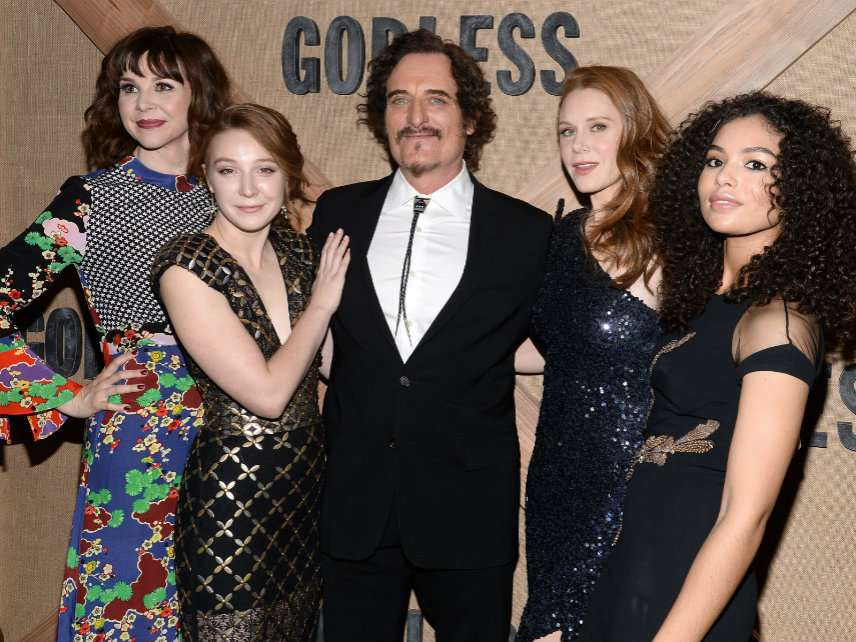<em>Godless</em> Is a Classic Western for the New Millennium
- OurStudio

- Nov 24, 2017
- 3 min read

Anthony Behar/Sipa USA/Newscom
Godless. Available now on Netflix.
When screenwriter Scott Frank was taking his script for Godless—then planned as a film rather than a TV miniseries—around to studios, he recalls that he was inevitably greeted with enthusiasm, but of entirely the wrong kind. "Oh, you wrote a Western," the suits would say. "I really hope someone else makes it." In today's Hollywood, Westerns are regard as politically malodorous relics of a white-guy Manifest Destiny era, and, even worse—so much worse, so much—dead on arrival in the overseas box-office sweepstakes.
So thank heavens—or perhaps some lower theologic entity, it's not clear yet—for Netflix, which not only bought Godless on the spot but suggested tripling its length to turn it into a TV miniseries.
Godless is a classic Western, the sort with big skies, wide prairies, gorgeous desolation, thundering herds, and smoking six-shooters. There are good men with failed nerves and bad men who get worse. Morality clashes with survival and doesn't always win.
Frank has been mostly known as a screenwriter. (Among other things, he adapted Phillip K. Dick's short story Minority Report for Steven Spielberg.) But on Godless he took the writing and producing reins, too, and the scope of his vision is obvious from the show's opening moments:
Several men ride into a town, nearly invisible in the middle of a blinding dust storm, the only sound the tolling of a lonely church bell. Little by little, forms emerge from the darkness … two, three, four, many. Shot, stabbed, crushed, dangling from the end of ropes. At the end of main street, the telegraph chatters with messages that no living hand will ever decipher.
This hellish landscape is the work of Frank Griffin (Jeff Daniels, disguised under a beard the size of a rose bush), a psychopathic bandit whose recitation of Biblical scripture usually presages the violent death of somebody, or more likely, a bunch of somebodies.
Griffin and his gang obliterated the town in the process of trying to rob a train carrying the railroad payroll. Their ordinary blood-lust went into overdrive when the $50,000 proceeds of the heist was made off with by Griffin's renegade lieutenant, master gunslinger Roy Goode (Jack O'Connell, Unbroken). To add injury to insult, Goode blew Griffin's arm off while making his escape.
Now Goode is racing across the desert with Griffin in hot pursuit. Their paths will soon converge in a New Mexico town called, with exquisite irony, La Belle. Virtually destroyed—both physically and economically—by a mining explosion that killed nearly the entire adult male population, La Belle is now home mostly to just a few dozen penniless widows.
Worse yet, the face of the law in La Belle is a discredited sheriff, Bill McNue (Scoot McNairy, Halt And Catch Fire), scorned by the townspeople as a coward for unspecified reasons. Their contempt would increase ten-fold if they knew his secret—that he's going blind. His only supporter is the twice-widowed Alice Fletcher (Michelle Dockery, Downton Abbey), whose ability to keep wringing a living out of the ranch without a man to lean on has made the citizens of La Belle regard her as a witch or worse, a consort of Indians.
The collision of all these vectors results in a show that's something like a handball match between High Noon and The Magnificent Seven, in which meditations on the nature of courage and the meaning of masculinity are batted back and forth with poignancy and clarity (and none of the fruitless debate about whether Gary Cooper is supposed to represent Dalton Trumbo or Joe McCarthy).
But Frank has deftly moved the terms of the debate into the new millennium, without any sense of heavy-handed political correction looming overhead. The demographics of La Belle—which were plenty real for a number of mining towns in the 19th century—allow a plausible feminist overlay at times. And Frank makes use of a real-life New Mexico town founded (albeit a couple of decades later than the time of Godless) by black Civil War veterans to introduce questions of race.
The result is a series that feels both traditional and new, with the big-screen qualities of a film and the story and character nuance of the best serialized television. This last is exploited to best advantage by Frank's cast.
Daniels goes wildly and successfully against type with his wild portrayal of the schizoid outlaw Griffin, while Dockery and O'Connell take the reverse approach, leaking the subtle secrets of their characters slip out in wispy traces. And a special word is due for Merritt Wever, who affectionately played eccentric young women in Nurse Jackie and The Walking Dead. As Sheriff McNue's sister, she's heartbreakingly effective in the opposite direction, as a woman so bitterly broken by serial family tragedies that, after a while, I began to suspect the title of Godless refers not to Daniels' character, but hers.




Comments